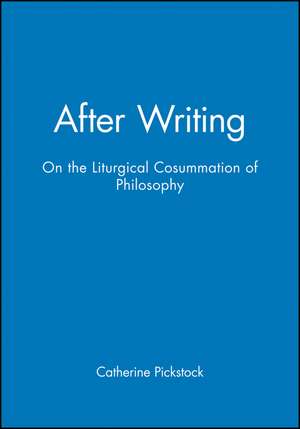After Writing: On the Liturgical Cosummation of Philosophy: Challenges in Contemporary Theology
Autor Catherine Pickstocken Limba Engleză Hardback – 19 noi 1997
Din seria Challenges in Contemporary Theology
-
 Preț: 292.45 lei
Preț: 292.45 lei -
 Preț: 184.39 lei
Preț: 184.39 lei -
 Preț: 403.54 lei
Preț: 403.54 lei - 23%
 Preț: 428.98 lei
Preț: 428.98 lei -
 Preț: 422.91 lei
Preț: 422.91 lei -
 Preț: 367.28 lei
Preț: 367.28 lei - 9%
 Preț: 776.36 lei
Preț: 776.36 lei -
 Preț: 357.99 lei
Preț: 357.99 lei -
 Preț: 393.09 lei
Preț: 393.09 lei - 8%
 Preț: 668.42 lei
Preț: 668.42 lei -
 Preț: 331.17 lei
Preț: 331.17 lei -
 Preț: 312.11 lei
Preț: 312.11 lei - 9%
 Preț: 695.24 lei
Preț: 695.24 lei -
 Preț: 296.69 lei
Preț: 296.69 lei -
 Preț: 308.50 lei
Preț: 308.50 lei - 8%
 Preț: 545.39 lei
Preț: 545.39 lei -
 Preț: 511.70 lei
Preț: 511.70 lei -
 Preț: 354.45 lei
Preț: 354.45 lei -
 Preț: 425.74 lei
Preț: 425.74 lei - 27%
 Preț: 1071.22 lei
Preț: 1071.22 lei - 23%
 Preț: 466.24 lei
Preț: 466.24 lei - 27%
 Preț: 978.75 lei
Preț: 978.75 lei -
 Preț: 419.04 lei
Preț: 419.04 lei -
 Preț: 481.87 lei
Preț: 481.87 lei -
 Preț: 504.53 lei
Preț: 504.53 lei - 32%
 Preț: 608.54 lei
Preț: 608.54 lei - 29%
 Preț: 243.00 lei
Preț: 243.00 lei - 28%
 Preț: 263.03 lei
Preț: 263.03 lei - 34%
 Preț: 606.46 lei
Preț: 606.46 lei - 34%
 Preț: 645.34 lei
Preț: 645.34 lei - 32%
 Preț: 538.13 lei
Preț: 538.13 lei - 31%
 Preț: 456.38 lei
Preț: 456.38 lei - 30%
 Preț: 469.23 lei
Preț: 469.23 lei - 28%
 Preț: 201.83 lei
Preț: 201.83 lei - 31%
 Preț: 426.92 lei
Preț: 426.92 lei
Preț: 696.86 lei
Preț vechi: 1048.83 lei
-34% Nou
Puncte Express: 1045
Preț estimativ în valută:
133.36€ • 138.17$ • 111.30£
133.36€ • 138.17$ • 111.30£
Carte indisponibilă temporar
Doresc să fiu notificat când acest titlu va fi disponibil:
Se trimite...
Preluare comenzi: 021 569.72.76
Specificații
ISBN-13: 9780631206712
ISBN-10: 063120671X
Pagini: 320
Dimensiuni: 152 x 229 x 20 mm
Greutate: 0.64 kg
Editura: Wiley
Seria Challenges in Contemporary Theology
Locul publicării:Chichester, United Kingdom
ISBN-10: 063120671X
Pagini: 320
Dimensiuni: 152 x 229 x 20 mm
Greutate: 0.64 kg
Editura: Wiley
Seria Challenges in Contemporary Theology
Locul publicării:Chichester, United Kingdom
Public țintă
upper level undergraduates and graduates in theology, philosophy and critical theory; researchers in these areasNotă biografică
Catherine Pickstock is a Research Fellow at Emmanuel College, Cambridge.
Descriere
A contribution to the growing genre of works which offer a challenge to the modern and post-modern accounts of Christianity. The book shows how Platonic philosophy did not assume a primacy of metaphysical presence, as had been previously thought, but a primacy of liturgical theory and practice.
